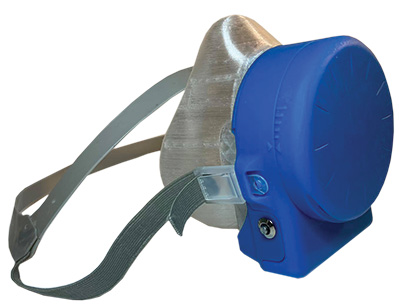Meet MIZ-MASK: the electronic respirator startup killing Corona with UV
 While shirts with cut-out cloth that can double as a face mask in times of need may seem fashionable, they’re not functional. Nor are entire aquarium bowls replete with oxygen tanks. And though a face shield might present makeup stains, by itself it can’t stop the relentless crusade of Covid-19.
While shirts with cut-out cloth that can double as a face mask in times of need may seem fashionable, they’re not functional. Nor are entire aquarium bowls replete with oxygen tanks. And though a face shield might present makeup stains, by itself it can’t stop the relentless crusade of Covid-19.
But David Mizandari, founder of Georgian startup MIZ-MASK, claims he has an option that everyone can get behind – literally.
Already a proven innovator on Georgia’s startup scene, the founder of biletebi.ge and a startup that aims to perfect the production of Georgia’s woefully underproduced clay wine vessel, the qvevri (think, amber wine) via 3D printing, Mizandari told Investor.ge that when the coronavirus finally made its way to Georgia, his first thought was: What can I do to help out?
A graduate of Georgian Technical University in industrial power and engineering with extensive experience in the design of medical devices used to neutralize biohazards, it turned out there was a sizable amount he could do.
“There was a deficit of masks in the very beginning, and there were concerns about the efficacy of normal medical masks, particularly for people working on the front lines of the virus’ offensive. I began researching the problem immediately. I assembled a mask prototype that uses UV light as its main weapon against the virus. There was nothing similar to what I was doing on the market, so I took my project and submitted it to GITA’s call for innovative startup ideas during the crisis, and won. My partner and I received 15,000 lari, and we went from there”, Mizandari says.
127 versions and six months of work later, a working prototype was born, offering complete airborne threat protection to users, boasting six filtration steps, the ability to adapt to individual breathing rhythm and double N99+ standard air filtration.
The device is fully chargeable within just 1.5 hours, can run for six, and has already received a number of attestations to its efficacy, including from Tbilisi-based defence and personal protection equipment producer Delta in Tbilisi.
The US-built Lugar Laboratory has also given the green light to the mask after tests against industry standards with the strongest bacteria, and whose seal of approval effectively clears the mask for use in the US. The Institute of Optics has also determined that the device emits no UV light outside of the mask itself, important because the light frequency can damage the skin and eyes.
The design is so groundbreaking, Mizandari says, that a leading lab in the field, Nelson Labs, told Mizmask it was unable to offer a certificate of approval given that they had no testing protocol for the product.
Mizandari says similar approaches with UV light elsewhere have not worked up until now due to design issues.
“One problem that many companies have run into is that they use black filters with active carbon, which can stop much of the virus by absorbing it, but it doesn’t kill them, making it necessary to sterilize the mask itself as well, and posing a risk.”
Mizmask is sterilized constantly. To provide this functionality, Mizandari says, the Mizmask team worked tirelessly to choose the correct combination of the colored materials, filters and thickness, as well as polished aluminium that is able to reflect 85% of the UV light, sending the sterilizing beams throughout the entire device, wiping it clean of any and all biohazards.
Production
Negotiations with potential manufacturers in Georgia are ongoing, as are talks with private investors, and Mizandari says he hopes to begin sales on the local market in mid of January 2021.
STC Delta will have a capacity of 500 units per day in the beginning.
The mask will be primarily targeted to first adapters, medical workers, and other public workers such as police officers, and individuals who are unable to work remotely. MIZ-MASK is currently trying to market the mask to the government as well – to border service employees, the military, bus drivers and so on.
The cost will be about $149.
MIZ-MASK has been carrying on negotiations with US companies that deal in medical equipment as well, and is trying to begin production in the United States.
After the virus
With several bio firms having already announced the end of phase three trials and vaccine efficacy rates beyond 90%, there is light at the end of the tunnel, and 2020 will, never fear, come to an end. The coronavirus will remain, but life will, hopefully, begin to approach normality by the end of 2021.
Mizandari says MIZ-MASK is not concerned about the end of the epidemic, however, from a business point of view, as the product will continue to have a variety of applications.
“The masks will still find a use. For example, in biodefense, in the military. All militaries should have such devices. Also, now we know that such black swan events can (and do) happen. There will be continuous demand, in case we should be faced with a similar event in the future.”
____________________________ ADVERTISEMENT ____________________________


